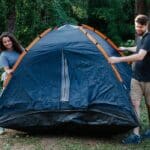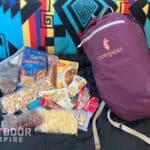If you’re just starting out tackling different types of hikes and treks, you may wonder what the difference is between the common terminology you hear other backpackers use.
Or, if you’ve been in the game for a while, you may become irritated with others who lump similar terms together as if they are interchangeable.
Trying to explain the difference between trekking vs. backpacking is kind of like splitting hairs. The differences between the two are small and nuanced. Backpacking is going on a hike while carrying your supplies in a backpack. Trekking is going on a longer hike, not necessarily carrying your own supplies.
I love nothing more than spending time in the great outdoors. According to the National Park Service, there are more than 21,000 miles of trails to explore across the United States. Let’s talk about whether you should backpack or trek those trails!
What Is Backpacking?
Backpacking refers to going on a long journey while carrying one’s supplies in a pack. These supplies likely reflect the length of the journey and what the backpacker will expect to encounter.
A lot of outdoor gear is specifically designed for backpacking. While specific gear is not always necessary, it can be for certain items. For example, you won’t take the same type of tent backpacking that you might when car camping.
In a typical backpacker’s pack, you may find the following items:
- Food, snacks, and water
- A tent
- A sleeping system
- A multi-tool or knife
- A portable stove
- Clothing
- A first-aid kit
- Sunscreen
- Hunting or fishing equipment
You will also need hiking boots, a large backpack to comfortably carry your supplies for the trip (be careful not to overpack!), and a hat to shade your face from the sun.
Naturally, if you intend to go on a two-day journey, you won’t need as many supplies as someone who wishes to backpack through the mountains for a week.
There is a popular subcategory of backpacking called ultralight backpacking. This type of backpacking embraces minimalism. These backpackers take only what is absolutely necessary. This way, extra supplies don’t burden them and they don’t have a gigantic pack weighing them down.

What Is Trekking?
Unlike backpacking, trekking usually refers to a long journey that is more difficult, strenuous, and physically demanding. A beginner to this sport likely would not consider completing a trek before they had tried a few hikes or first-time backpacking adventures. A trek can last for several days.
In contrast to backpacking, a trekker may or may not carry all of the gear they’ll need for the whole trip on their back. On occasion they may stay at bed and breakfasts, alpine lodges, or hotels along the route. And they may acquire provisions along the way at shops or by stocking food cahces in advance.
Unlike standard hikes, many treks include cultural events and activities along the trail. A trek is often a culturally immersive experience rather than just a jaunt through nature.
For example, in Asia, trekking often refers to long journeys through jungle areas or mountainous trails. If you are going to another country to complete a trek, you may have the option of purchasing a package deal that allows you the opportunity to stay in specific housing or attend local ceremonies along the way.
The Difference Between Trekking and Backpacking
Trekking and backpacking are more similar than different. In both activities, you are likely carrying a pack on your body as you walk for several days, or even weeks. Backpacking trips can be shorter, while treks are usually longer and refer to more advanced, extended types of adventures.
Backpacking often refers more to backcountry trips where you pack everything you need for the duration of the trip. Treks often pass through wild places too, but usually intersect with populated areas along the route where you can stock up on supplies or have a hot shower and warm bed for the night.
To make matters more confusing, the differences are often regional. Backpacking is a more common term in America, while trekking is used frequently by others around the world.
I lived for some time in France near the Pyrenees Mountains, which is famous for trekking, and that’s how most English-speakers there refer to it. Britains and other Europeans flock to Southern France and Northern Spain to trek from the Atlantic Ocean to the Mediterranean Sea over the course of several weeks. You can stock food caches at Alpine lodges along the way and pass through the occasional Basque village. That trek is on my bucket list!
What About “Hiking”?
If trekking and backpacking refer to two different yet similar activities, what about “hiking”? Though some people may use this term to refer to walking through mountainous or hilly terrain, it can refer to any activity that involves walking around outside.
You can simply think of backpacking and trekking as types of hiking, or you may wish to use more specific terms when referring to your activities. Depending upon where it’s sold, hiking gear usually refers to any equipment used outdoors to backpack, trek, traverse, or walk outdoors for an extended time.
How To Find Each Type of Adventure
How does an aspiring backpacker or trekker find each type of activity in a world where everyone uses different terms?
For example, if you are expecting a long, arduous trek, you may be confused, and a bit irritated when a pamphlet advertising a new adventure turns out to be a shorter, easier adventure for people who have never even backpacked before.
We’ve listed a few tips below for how you can more easily find each type of activity:
- Read all of the material you can find on each trail you’re interested in.
- Ask friends and fellow backpackers who have more experience than you do.
- Understand that the word “trek” may refer to different activities depending upon the part of the world you’re in (or traveling to).
- Consider the area, weather, distance, and time of year you will be completing the journey. These factors will make your trip easier or harder.
- If you’re a beginner, consider starting with a day trip or planning multiple stops along the way during a longer backpacking adventure.
- Always focus on taking only what you need, picking up trash, and resisting the urge to disturb plants and wildlife regardless of where you choose to go!





